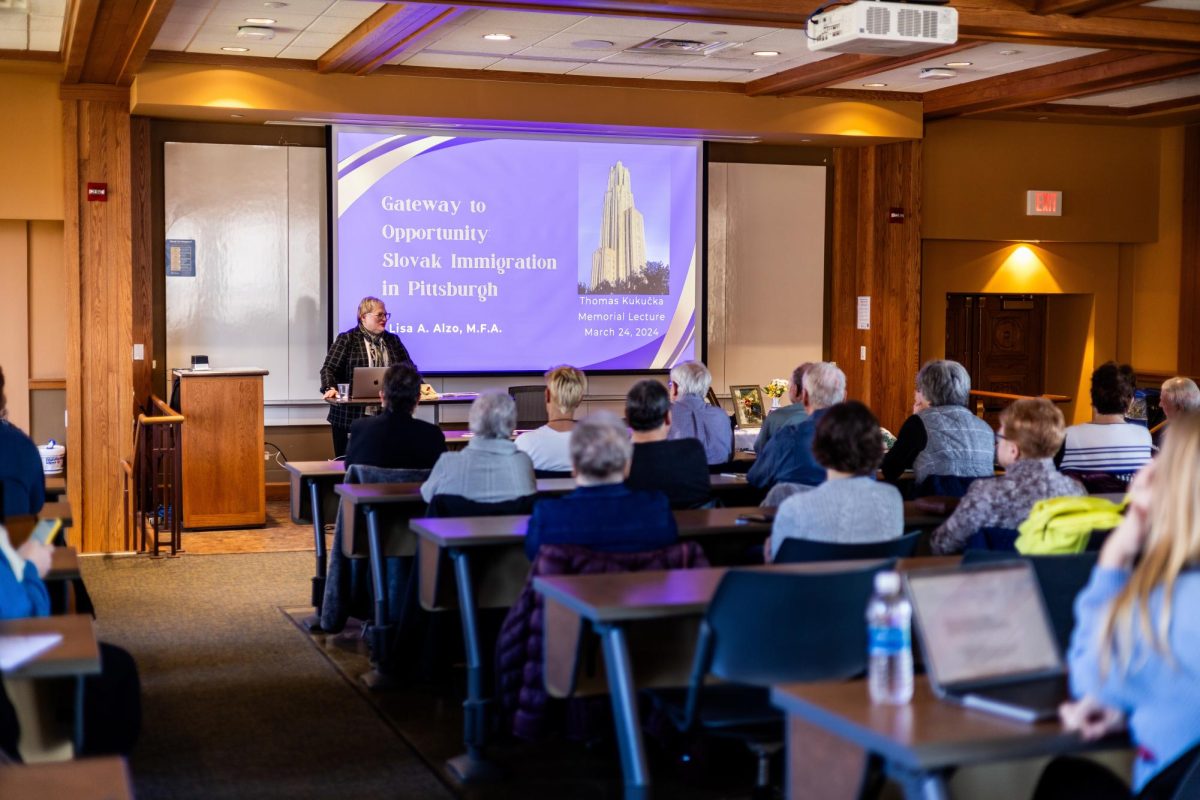As someone with Slovak heritage, freelance writer Lisa Alzo said she shares interests with former Pittsburgh Press reporter Thomas Kukučka. Kukučka has a scholarship in his name at the University of Pittsburgh, made possible by private and family donations.
“It’s just such an honor for me to be here to deliver this lecture to you,” Alzo said.
Pitt Slovak’s language department hosted their 36th annual Thomas Kukučka Memorial lecture Sunday afternoon in the Cathedral of Learning, which featured discussion of Slovak immigration in Pittsburgh.
During the lecture, Alzo said she spent a long time studying Slovak language and English as a student at the University of Pittsburgh.
“At the time, I was living at home, and I was asking my mother questions about my Slovak grandmother,” Alzo said. “I never once asked my grandmother questions about her life, her immigration experience, anything like that. It’s my biggest regret.”
Since Alzo’s mother saved her grandparents’ immigration documents, Alzo said she focused her thesis project on her mother and grandmother. The project eventually became her 2001 book “Three Slovak Women.” With her research, Alzo is able to tour and give lectures on genealogy.
“I’ve lectured all over the United States. It’s been such a wonderful opportunity for me, but I’m so happy to be back home. Pittsburgh is my home,” Alzo said. “I currently live in New York, but Pittsburgh will always be home.”
Alzo said she hopes to permanently move back to Pittsburgh one day, as she has Slovak family and friends in the city.
“To understand the significance of Slovaks in Pittsburgh, you have to understand the larger picture of immigration,” Alzo said.
Alzo recommended looking at push-pull factors to understand the context of immigration, or what is pushing people to leave their countries and what is pulling them to new places.
In the case of Slovak immigration, Alzo said, “There were cholera epidemics and other crop failures that pushed people out. This was a big impetus for them to leave and start a new life.”
As immigrants left their homelands, Alzo said people like her grandfather had to leave their families back home. During the early immigration years, she said Slovak men did not take their wives and children, since most planned to make money in the United States then return to Slovakia for their families and to buy land.
“These immigrants would arrive at Ellis Island and other ports. Many immigrants fell ill during the voyage,” Alzo said. “America needs workers for its factories and mills, and these steamship companies enticed many laborers from Slovakia by telling stories about how America was a land of plenty.”
However, Alzo said men instead stayed in the United States and later sent for their wives to come to America. She described other immigrants as “birds of passage,” meaning they traveled back and forth between their home country and the United States to buy land for their families back home.
“I was able to go to Slovakia and see the land that is still in my family today. This is due to the efforts of my great-grandfather and grandfather,” Alzo said.
The tradition of traveling to Slovakia is continued at Pitt through the Thomas Kukučka Memorial Scholarship, which will cover the travel expenses of award recipients Olivia Beckage and Christina Matrick for their Slovak study abroad trip.
“I am so excited to explore my Slovak roots. I am also excited to travel and see a new part of Europe I haven’t been to before,” Beckage, a junior history and philosophy major, said.
Last year’s scholarship recipient, junior biological science major Abagail Kraus, also studied abroad in Slovakia.
“I stayed for three weeks in the dorms with 10 girls and one bathroom. I learned about the language,” Kraus said. “It was a great way for me to continue my education over the summer.”
Continuing with the lecture, Alzo said when her grandfather immigrated to the United States, he arrived at the Port of New York and went to McKees Rocks in Allegheny County to find a job. Eventually making his way to Duquesne, he started work at the Duquesne steel mill.
“I took this photo at the Duquesne steel mill,” Alzo said. “As a child, I remember summer evenings standing on the back porch and it faced the steel mill and I could see the blue and orange flames. Pittsburgh has really shed its smoky history, and is now known for many other things.”
As Alzo’s grandparents stayed in America, she said they eventually adopted American traditions like cheering for the Steelers.
“My grandmother didn’t understand the game, but she would be right there cheering for us,” Alzo said.
While her grandparents adopted American traditions, Alzo said they also brought Slovak traditions of their own to the United States.
“My aunts carry on the tradition of making traditional Slovak food. The food and the culture are always part of Slovak life,” Alzo said. “This is what it means to be Slovak.”
Concluding the lecture, Alzo said people should honor heritage and attend dances and other festivals that continue traditions.
“The journey of a thousand miles begins with a single step. For those immigrants that came before us, we stand on their shoulders. It is family, faith, love, hope and inspiration that I know my family received from my grandparents, and we try to continue it today,” Alzo said.



